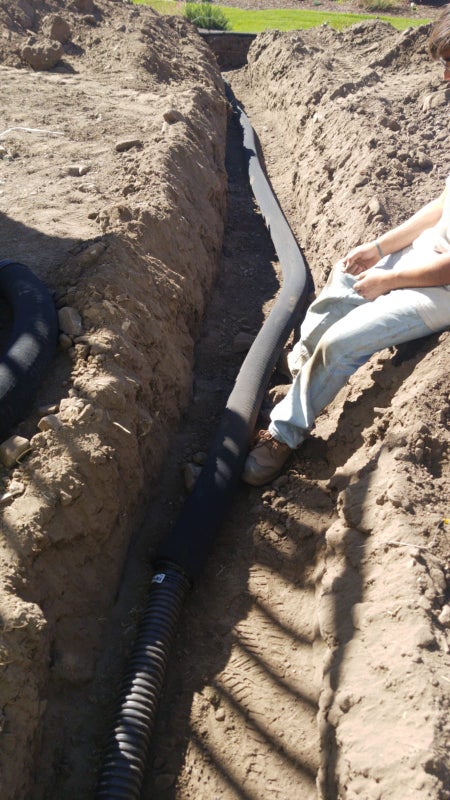Stormwater management companies play a crucial role in protecting properties and the environment in Salt Lake City, UT.
With the city’s unique climate and geography, effective stormwater management is essential for preventing flooding, erosion, and water pollution.
This comprehensive guide will cover the importance of compliance with local regulations, the process of designing and implementing a stormwater management system, essential maintenance and monitoring practices, and how to choose the right stormwater management company for your property.

Installation of drainage pipes in trench for stormwater management
Ensuring Compliance with Salt Lake City’s Stormwater Regulations
Stormwater management in Salt Lake City is governed by a combination of local, state, and federal regulations.
These laws are designed to protect water quality, prevent flooding, and minimize the environmental impact of urban development.
| Regulation | Purpose | Enforcement Agency |
|---|---|---|
| Salt Lake City Stormwater Ordinance | Establishes local stormwater management requirements | Salt Lake City Department of Public Utilities |
| Utah Pollutant Discharge Elimination System (UPDES) | Regulates stormwater discharges from construction sites and industrial facilities | Utah Department of Environmental Quality |
| Clean Water Act (CWA) | Federal law governing water pollution and stormwater management | U.S. Environmental Protection Agency (EPA) |
Stormwater management companies ensure compliance by staying up-to-date with regulatory changes, obtaining necessary permits, and implementing best management practices (BMPs) to control stormwater runoff.
Failure to comply with these regulations can result in fines, legal action, and damage to the environment.
Property owners may face challenges in understanding and meeting these requirements, making it essential to work with experienced professionals.
Designing and Implementing a Customized Stormwater Management System
An effective stormwater management system is tailored to the specific needs and characteristics of a property.
The design process involves assessing factors such as:
- Site topography and drainage patterns
- Soil type and infiltration capacity
- Impervious surface area (e.g., roofs, pavement)
- Local climate and rainfall patterns
- Proximity to water bodies and environmentally sensitive areas
Based on this assessment, stormwater management companies develop a comprehensive plan that incorporates various components, such as:
| Component | Function | Example |
|---|---|---|
| Detention basins | Temporarily store and slowly release stormwater | Dry or wet ponds |
| Infiltration systems | Allow stormwater to percolate into the ground | Bioretention cells, permeable pavement |
| Conveyance structures | Transport stormwater to storage or treatment areas | Swales, channels, pipes |
Green infrastructure solutions, such as rain gardens and green roofs, are increasingly popular for their ability to manage stormwater while providing additional environmental and aesthetic benefits.
During the implementation phase, stormwater management companies oversee the construction process, ensuring that the system is installed according to the approved plans and specifications.
Essential Maintenance and Monitoring for Long-Term Stormwater Solutions
Regular maintenance and monitoring are critical for ensuring the long-term effectiveness of a stormwater management system.
Neglecting these tasks can lead to reduced performance, increased pollution, and costly repairs.
Recommended maintenance practices include:
- Inspecting and cleaning catch basins, inlets, and outlets
- Removing sediment and debris from detention basins and infiltration systems
- Maintaining vegetation in bioretention areas and swales
- Repairing damaged or eroded components
- Replacing filter media as needed
Monitoring involves regularly assessing the performance of the stormwater management system and collecting data on water quality, flow rates, and other key parameters.
This information helps identify potential issues and guide maintenance efforts.
| Monitoring Parameter | Purpose | Frequency |
|---|---|---|
| Water quality (e.g., sediment, nutrients) | Ensure compliance with discharge limits | Monthly or quarterly |
| Flow rates and volumes | Assess system capacity and performance | During storm events |
| Vegetation health | Maintain effectiveness of bioretention areas | Semi-annually |
By implementing a proactive maintenance and monitoring program, stormwater management companies can extend the life of the system, optimize its performance, and prevent costly failures.
How to Select the Right Stormwater Management Company for Your Property
Choosing the right stormwater management company is essential for ensuring the success of your project and long-term protection of your property.
When evaluating potential companies, consider the following factors:
- Experience and expertise in stormwater management, particularly in Salt Lake City’s unique conditions
- Familiarity with local, state, and federal regulations
- Range of services offered, from design and installation to maintenance and monitoring
- Certifications and licenses demonstrating professional qualifications
- Reputation and references from previous clients
When interviewing companies, ask about their approach to stormwater management, their experience with projects similar to yours, and their process for ensuring regulatory compliance.
Also, inquire about pricing, service agreements, and warranties to ensure you understand the full scope of their services.
Why Effective Stormwater Management is Crucial for Property Protection in Salt Lake City
Investing in high-quality stormwater management solutions offers numerous benefits for property owners in Salt Lake City, including:
| Benefit | Description |
|---|---|
| Reduced flood risk | Properly designed systems minimize the risk of flooding and associated property damage |
| Erosion control | Stormwater management practices help stabilize soil and prevent erosion |
| Improved water quality | Stormwater treatment reduces pollution and protects local water bodies |
| Regulatory compliance | Adhering to stormwater regulations avoids fines and legal issues |
| Enhanced property value | Well-managed stormwater systems can increase property value and marketability |
Salt Lake City’s unique climate, characterized by heavy snowmelt and intense summer thunderstorms, makes effective stormwater management especially critical.
Without proper controls in place, these events can overwhelm drainage systems and cause significant damage.
By working with a certified stormwater management company, property owners can develop customized solutions that address their specific needs, comply with regulations, and provide long-term protection for their investments.

Properly installed curb and drainage system for stormwater management
FAQs
How do stormwater management companies in Salt Lake City ensure compliance with local regulations?
Stormwater management companies ensure compliance by staying current with regulatory changes, obtaining necessary permits, and implementing best management practices to control stormwater runoff. They also assist property owners in understanding and meeting these requirements.
What is the process for designing and implementing a stormwater management system in Salt Lake City?
The process involves assessing site-specific needs and characteristics, developing a comprehensive plan that incorporates various components (e.g., detention basins, infiltration systems), and overseeing the construction process to ensure proper installation.
What maintenance and monitoring requirements are necessary for effective stormwater management?
Regular maintenance practices include inspecting and cleaning system components, removing sediment and debris, maintaining vegetation, and repairing damaged or eroded areas. Monitoring involves assessing water quality, flow rates, and system performance to guide maintenance efforts and ensure compliance.
How can I choose the best stormwater management company for my property in Salt Lake City?
When choosing a stormwater management company, consider their experience and expertise in Salt Lake City’s unique conditions, familiarity with regulations, range of services offered, certifications and licenses, and reputation and references from previous clients.
What are the potential penalties for non-compliance with stormwater regulations in Salt Lake City?
Failure to comply with stormwater regulations can result in fines, legal action, and damage to the environment. Penalties may be imposed by local, state, or federal agencies, depending on the nature and severity of the violation.


